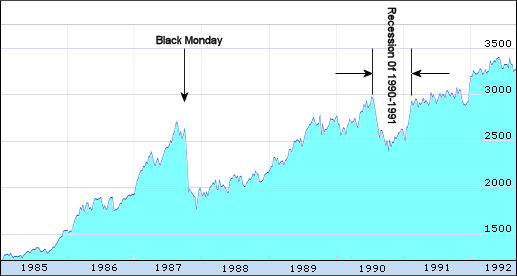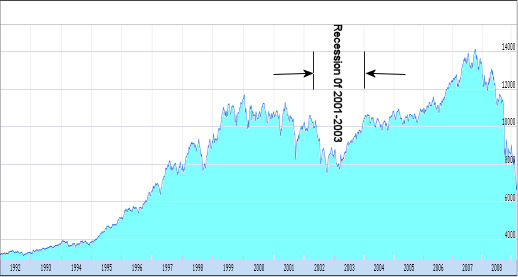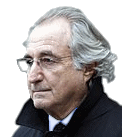Since yesterday, I’ve been thinking about the assumption that Madoff’s wife and son’s, his brother, were part of his glamorous scheme. It’s easy to target the wife. She’s been on the payroll in the past. She’s definitely into having "stuff." Her face has definitely been "stretched." And she’s trying to hang on to a $7M penthouse and $70M in assets, claiming it’s not proceeds from the Ponzi Investment Empire of her husband. Those things make Ruth Madoff hard to love [since we know that her cookbook didn’t sell all that well].
Likewise, reading Bernie’s statement, he went out of his way to try to put a firewall between his Ponzi Investment Centrals and his trading business on the next floor run by his brother and his sons. He infused some Capital into their business from his and he makes some tortured arguments to explain that away. He’s obviously trying to protect his family’s ability to go on with their own lifestyles after his trip up the river. That, in itself, is infuriating in and of itself. Bernard Madoff ruined countless peoples’ ability to be comfortable [or even solvent] in their retirement, yet he wants to be sure that his own family’s assets aren’t decimated paying them back – the people he robbed. It makes the blood boil!
But that aside, I really wonder if there is any money left, hidden around somewhere, that can be retrieved. I doubt it for a couple of reasons. First, the way Bernie got started in the Ponzi business was to cover up his losses in the 1990 Recession. And over the next 18 or 19 years, he kept things going through thick and thin. He survived the last Recession [2002]. He survived the SEC. He even survived Harry Markopolos [no small feat]. I think if he could’ve laid his hands on any money, he would’ve used it to try to keep his scheme going. As much as he said that he anticipated "this day," he doesn’t seem to have planned for it very well. I suspect that his denial system allowed him to keep it out of his mind. He was still taking Investors up until the bitter end.
But the main reason I doubt that there’s any money around is the math. There’s no way for us to model it because we just have no idea what came in when, but I think one can make some educated guesses. Some people probably gave Bernie money to "grow it," so he didn’t have to pay anything out. But a lot of people gave him money and lived off of their yield – monthly checks from "Uncle Bernie." If you gave him $1M, that would give you an average monthly yield of $12,000 a month [or $144,000 a year] at an average of 12% Interest, but since he paid a "feeder" to get his business, he was needing to generate 16% [Markopolos’ estimate].

So [left graph] let’s assume that someone gave Bernie $1M back when he started and drew their monthly yield to live on. Since Bernie’s paying out of the Principle, that million is gone in seven years, but Bernie’s obligated to continuing to pay [it’s expensive to run a Ponzi Scheme]. So he has to take in more money to keep up with his obligations. But when he takes in more money, he’s obligated to pay out even more money. Just for kicks, if we consider only those pesky clients that withdraw their monthly yield, how much would Bernie have to take in just to stay even? $17M to cover the original $1M over his 18 years [right graph]. And that doesn’t take in the cost of his overhead, or the amount he took out to keep up his lavish lifestyle. Those things multiply that graph geometrically.
So if you add in his overhead, his outrageous personal expenses, and the fact that he had to have a lot of Capital on hand to pay off those even peskier clients who made really big withdrawals or pulled out altogether, the cost of running a Ponzi Scheme is astronomical – a hungry beast demanding increasingly huge amounts from new clients. It’s hard work being a Ponzi Scheme Manager. It’s a bit like a "reverse Pyramid Scheme." The more you take in, the greater your costs. That he kept it going 18 years is remarkable. That he would have hidden assets would be even more remarkable, because of all those annoying retirees and charities constantly taking money out of his system.

 In his 18 year Ponzi career, he obviously had expenses, commissions to feeders, his own take home pay – lots of money going out above the payments to his clients. Using the simple model above, how much would he have to have generated just to keep afloat on somebody’s million dollar investment. The graph on the right shows how much he’d have to take in to maintain that original $1M depending on the percentage he paid out [his 12% dividend plus his other expenses and his own take].
In his 18 year Ponzi career, he obviously had expenses, commissions to feeders, his own take home pay – lots of money going out above the payments to his clients. Using the simple model above, how much would he have to have generated just to keep afloat on somebody’s million dollar investment. The graph on the right shows how much he’d have to take in to maintain that original $1M depending on the percentage he paid out [his 12% dividend plus his other expenses and his own take].
Parenthetically, much has been made about him being "selective" in accepting clients. I’m suspecting another explanation for that behavior. Were I running a Ponzi Scheme, I’d only want Investors who left their money in the system to "grow it." Since I wouldn’t be sending them monthly checks, they wouldn’t deplete my reserves. Clients who took their dividends out to live on, or charities that used their dividends to build libraries and feed the poor would take actual money out of my system, so I’d have to go out and scare up other "suckers." So maybe his selectiveness had another motive.
Obviously my examples are vastly over-simplified, but I think they make the obvious point that the geometric escalation of the thievery needed to keep a Ponzi Scheme alive is staggering. It’s probably why your local Community Bank doesn’t have a Ponzi-based Money Market Account program. In spite of his opulent lifestyle, Bernie Madoff was hanging on by a thread as soon as the market tanked and people started wanting their money. Where did it go? He either spent it or paid it out in "interest" over the years.
I’m guessing that for Madoff’s clients, "what you see is what you get," and that most of what’s left is that bit that Ruth is trying to hold on to [Most of us would be happy for her to take up residence in the local federal detention facility, and let their victims split it up – an average of a paltry $16,739 for each of his 4600 clients].

As long as we’re playing with the Madoff numbers, consider the case of Smith and Jones, neighbors who are both clients of Madoff Investments. Ten years ago, each of them put a million dollars into Bernie’s Fund. Smith has retired and is living off of the interest on his investment. Jones is still working and leaving his money in the fund to grow it for retirement. At Thanksgiving 2008, they compare notes. Smith has drawn $1,268,250 out of his retirement and still has $1,000,000 in the Fund. Jones has left his in place and sees himself as now worth $3,300,387. At Christmas [after finding out about Bernie’s Ponzi Scheme], Jones thinks he’s lost $3,300,387 and is distraught [even though his real loss is $1,000,000]. Smith is upset too, thinking his $1,000,000 is gone [even though he’s actually $268,250 ahead]. Jones gets to thinking this isn’t exactly fair. So the manager of the Madoff mess has to reconcile all of this. He suggests that maybe Smith could pay Jones $634,125 and everything would come out fair [so they’re both down $365,875]. That’s called "clawback," presumabely because they’d have to claw the money back from Smith who will probably say, "I spent it already". So Smith dumps his remaining assets in a protected Trust and hires a Lawyer. Jones doesn’t retire, hires a Lawyer, and considers buying a gun.






 In his 18 year Ponzi career, he obviously had expenses, commissions to feeders, his own take home pay – lots of money going out above the payments to his clients. Using the simple model above, how much would he have to have generated just to keep afloat on somebody’s million dollar investment. The graph on the right shows how much he’d have to take in to maintain that original $1M depending on the percentage he paid out [his 12% dividend plus his other expenses and his own take].
In his 18 year Ponzi career, he obviously had expenses, commissions to feeders, his own take home pay – lots of money going out above the payments to his clients. Using the simple model above, how much would he have to have generated just to keep afloat on somebody’s million dollar investment. The graph on the right shows how much he’d have to take in to maintain that original $1M depending on the percentage he paid out [his 12% dividend plus his other expenses and his own take]. As long as we’re playing with the Madoff numbers, consider the case of Smith and Jones, neighbors who are both clients of Madoff Investments. Ten years ago, each of them put a million dollars into Bernie’s Fund. Smith has retired and is living off of the interest on his investment. Jones is still working and leaving his money in the fund to grow it for retirement. At Thanksgiving 2008, they compare notes. Smith has drawn $1,268,250 out of his retirement and still has $1,000,000 in the Fund. Jones has left his in place and sees himself as now worth $3,300,387. At Christmas [after finding out about Bernie’s Ponzi Scheme], Jones thinks he’s lost $3,300,387 and is distraught [even though his real loss is $1,000,000]. Smith is upset too, thinking his $1,000,000 is gone [even though he’s actually $268,250 ahead]. Jones gets to thinking this isn’t exactly fair. So the manager of the Madoff mess has to reconcile all of this. He suggests that maybe Smith could pay Jones $634,125 and everything would come out fair [so they’re both down $365,875]. That’s called "clawback," presumabely because they’d have to claw the money back from Smith who will probably say, "I spent it already". So Smith dumps his remaining assets in a protected Trust and hires a Lawyer. Jones doesn’t retire, hires a Lawyer, and considers buying a gun.
As long as we’re playing with the Madoff numbers, consider the case of Smith and Jones, neighbors who are both clients of Madoff Investments. Ten years ago, each of them put a million dollars into Bernie’s Fund. Smith has retired and is living off of the interest on his investment. Jones is still working and leaving his money in the fund to grow it for retirement. At Thanksgiving 2008, they compare notes. Smith has drawn $1,268,250 out of his retirement and still has $1,000,000 in the Fund. Jones has left his in place and sees himself as now worth $3,300,387. At Christmas [after finding out about Bernie’s Ponzi Scheme], Jones thinks he’s lost $3,300,387 and is distraught [even though his real loss is $1,000,000]. Smith is upset too, thinking his $1,000,000 is gone [even though he’s actually $268,250 ahead]. Jones gets to thinking this isn’t exactly fair. So the manager of the Madoff mess has to reconcile all of this. He suggests that maybe Smith could pay Jones $634,125 and everything would come out fair [so they’re both down $365,875]. That’s called "clawback," presumabely because they’d have to claw the money back from Smith who will probably say, "I spent it already". So Smith dumps his remaining assets in a protected Trust and hires a Lawyer. Jones doesn’t retire, hires a Lawyer, and considers buying a gun.

 But more than his getting away with running a massive Ponzi Scheme for almost two decades, the part that lingers is his willingness to do it- to play the big-shot and live the Life of Riley at the expense of his friends, his mentors, and his social network. None of us can get our minds around that. That he could do it by hiring a bunch of low-level employees and some bootleg storefront accountant under the nose of the SEC/CFTC says something terrible about our system. But that he would do it will make him an enigma hidden in a paradox for eternity. And his wife’s attempting to hold on to a $7M Manhattan penthouse and $70M in other assets, claiming that it didn’t come from his fraud indicates that she is part of the whole thing in some as yet unexplained way.
But more than his getting away with running a massive Ponzi Scheme for almost two decades, the part that lingers is his willingness to do it- to play the big-shot and live the Life of Riley at the expense of his friends, his mentors, and his social network. None of us can get our minds around that. That he could do it by hiring a bunch of low-level employees and some bootleg storefront accountant under the nose of the SEC/CFTC says something terrible about our system. But that he would do it will make him an enigma hidden in a paradox for eternity. And his wife’s attempting to hold on to a $7M Manhattan penthouse and $70M in other assets, claiming that it didn’t come from his fraud indicates that she is part of the whole thing in some as yet unexplained way.  “How do you now plead,” guilty or not guilty?
“How do you now plead,” guilty or not guilty?
